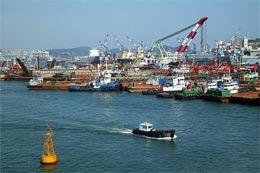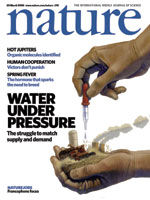 Water can make for easier transport than land... but at what price? Punchstock
Water can make for easier transport than land... but at what price? PunchstockThe South Korean president’s plan to tie together the county’s main waterways is riling scientists, economists and environmentalists at home and abroad.
President Myung-bak Lee, who assumed office on 25 February, has been pressing forward with plans for a ‘Grand Korean Waterway’, an ambitious plan to link all the country’s major rivers by canals.
The only part of the Grand Waterway about which any details have been released will connect the two largest rivers, the Han and the Nakdong, through a series of reservoirs with new dams and weirs. The 540-kilometre canal will allow barges to make the 2,100-kilometre journey from the capital Seoul in the north to the second largest city, Busan, in the south-east. This first stage of Lee’s plan is already meeting fierce opposition.
Lee’s website lists numerous advantages, including the creation of thriving trading ports at inland cities such as Daegu in the south. Lee says that half of the 14 trillion won (US$14 billion) will be covered from private investment and half from selling gravel recovered from the project. “Not a dime of taxpayer’s money will be spent, while gaining tremendous benefits such as distribution expense reduction, traffic cost reduction, flood prevention, water quality and environment improvement, tourist attractions,” the website states.
But others say that the expensive project will probably cost more than the estimate, cause flooding in some areas, disrupt habitats of endangered species and not necessarily provide any economic benefits. A network of professors nationwide is planning to announce their opposition to the canal plan at a press conference early next week, they told Nature News .
Shifting sands
According to Kyungsoo Yoo, a sediment transport specialist at the University of Delaware, Newark, the canal system is a risky one, affecting a 50,000 km2 watershed area: more than half of the total area of South Korea. Yoo warns that erosion would build, on average, a 80-centimetre thick layer of sediment each decade, which would vary from place to place and increase the risk of flooding. “It would not be surprising if a portion of the canal became choked within a decade, or even a year,” says Yoo. The river deltas will also be deprived of sediment, which the Three Gorges dam project in China showed can be problematic1.
Wetland and floodplain ecologist Changwoo Ahn of George Mason University,Fairfax, Virginia, says the toll taken by the dam and levee building over the past 100 years on the Illinois River and Upper Mississippi should be a lesson about what happens when flood plains are disturbed.“Now the US government spends millions of dollars each year to manage flood-plain wildlife refuges to grow certain plants as food sources for migrating birds which would be grown by the natural flow regime if it had not been altered,” Ahn says.
The South Korean project will interfere with wildlife too. Youngryel Ryu, a postdoctoral student specializing in biodiversity at the University of California, Berkeley,who has been outspoken in his opposition to the project, says the canal will further endanger 58 endangered species, including 8 fish and 40bird species.
And any benefit to carbon dioxide emissions from using boats instead of trucks for transport may be countered by the loss of vegetation and carbon sinks during the construction, says Dong-Gill Kim, a graduate student at Iowa State University studying environmental science.
Rising costs
Jung Wk Kim, a professor of environmental studies at Seoul NationalUniversity, says the 14-trillion-won estimate has left out some obvious costs, including relocating flooded villages. He estimates the cost at 40-50 trillion won.
Economist Jong Ho Hong of Hanyang University in Seoul also questions the economic gain to be had. The estimate of the economic impact of “the freight generation, tourism,job creation, local development and environmental improvement thatpro-canal experts claim is totally groundless,” he says. He calls for “thorough study by an independent group”, which he estimates would take 3–5 years.
That is unlikely to fit Lee’s schedule. While there is no official starting date for the project, Lee has said that he wants to finish it during his 5-year term. Opponents say the only thing that might stop it is a defeat for Lee’s Grand National Party in the coming parliamentary elections in April.
On 10 March, 381 Seoul National University professors formed a group to campaign against the project. “Mr Lee and the newly formed governmentare trying not to talk about the plan at this moment, since they know public opinion is not favorable about the project at all. They are afraid that emphasis on [the] canal project might damage the ruling party's chance to gain a majority of National Assembly seats. But once the general election is over, many expect that the government will use every means possible to enforce the project, including passing a special law to facilitate the process. It will be the worst-case scenario possible,” says Hong.
